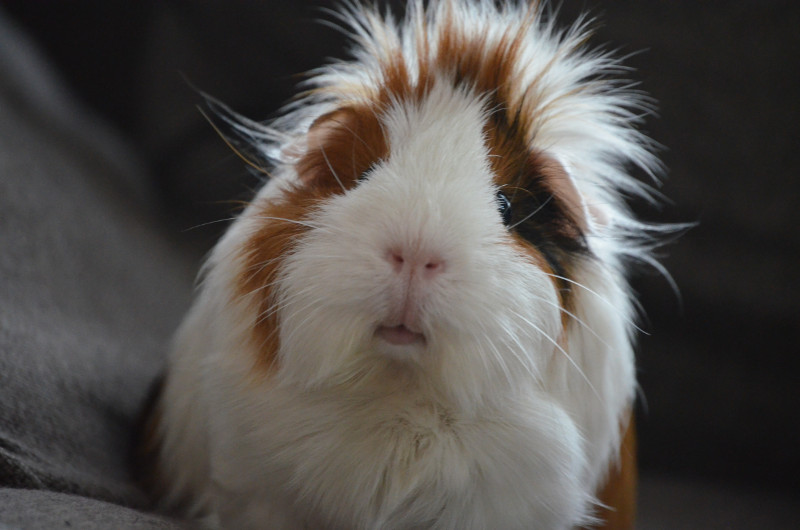Over the last decade, guinea pigs have become increasingly popular as small pets, and for many obvious (and some not so obvious) reasons. Guinea pigs are super cute, fluffy, and look very cuddly. Plus, they can be very fun to accessorize, with dozens of brands catering to all things guinea pig: from tunnels and huts to toys and enrichment activities.
If you’re considering a guinea pig for your family, developing some fundamental knowledge of proper guinea pig nutrition and care is where everything begins. Like any animal, they require consistent care and maintenance in order to live a healthy lifestyle.
Despite their small size, guinea pigs can be an expensive pet, too. They are prone to several health issues, like respiratory infections (pneumonia), urinary tract problems, scurvy, and more. While some health problems can be easily corrected, others may require expensive care from a veterinarian specializing in exotic small mammals.
When deciding if a guinea pig is right for you, consider the following:
Social Needs
Believe it or not, guinea pigs can actually die from loneliness. Because of this, they’re typically sold in bonded pairs. In the wild, guinea pigs live in small groups of up to ten that work to protect each other and provide much-needed social stimulation. In captivity, guinea pigs do best in same-sex pairs, or in a group with one neutered male among several females.
Isolation can be especially distressing for guinea pigs, and is only advised in rare situations.
Additionally, guinea pigs are prey animals, which means (from their perspective) big, towering human hands scooping them up can also cause a great deal of stress. It takes kindness, time, and patience to help guinea pigs become comfortable with being handled, so keep in mind they’re not an ‘instantly snuggly’ pet, despite looking like adorable characters in the latest animated blockbuster.
Space
Guinea pigs need a lot of space. In fact, some people dedicate an entire spare bedroom to their guinea pig habitat. Within their habitat they need spaces for hiding, snuggling, and sleeping, as well as a litter area, an eating area, and plenty of space to forage and play.
Guinea pigs are not the most agile animals, and cannot jump or climb well. Because of this, they need a flat space to play – and play they will! Guinea pigs are active for about 20 hours each day, and they need plenty of fun spaces to keep them entertained.
Within this active habitat comes lots of cleaning, too. Guinea pigs use the washroom frequently, often pooping little pellets every few minutes and peeing just as much, if not more so. In order to keep their habitat properly clean, a few spot cleanups per day may be required. Moreover, they are foraging animals by nature, and will regularly scatter bedding, shavings, and more around their environment.
Diet
Some pets, like cats and dogs, are rather easy to feed; simply pour some tasty kibble in their bowl and you’re all set. Guinea pigs, on the other hand, have specific, time consuming, and somewhat costly dietary needs.
Native to South America, in the wild they eat anything from fruits and leaves to roots, grasses, and various plants. As pets, guinea pigs primarily get their nutrition from fresh grass hays, like timothy hay. Other low-calcium hays like orchard grass and oat hay are popular choices as well. Since they’re not foraging in the wild, guinea pigs also require a complete and balanced food, which commercially comes in the form of fortified pellets. The most popular premium guinea pig food brands include Oxbow, Supreme, Versele-Laga, Small Pet Select, and more.
Next, guinea pigs require plenty of freshly prepared leafy greens and bright coloured vegetables. Bell peppers are a favourite!
A well-balanced guinea pig diet should consist of 70-75% grass hay, 20-25% fortified pelleted food, 5-10% fresh veggies, and 0-5% for a few yummy treats.
Supplementation
Guinea pigs cannot create Vitamin C on their own, and need to obtain it from their diet. While this can be found in fortified guinea pig-specific foods and fresh produce, it’s important to also supplement with a shelf stable vitamin C tablet every day to reduce the risk of developing scurvy.
With the right care, training, and planning, guinea pigs can make a wonderful pet for people of all ages. They’re certainly a great way to teach routine and responsibility for children aged six and above, too. Be sure to do plenty of research first, and if you have the time and discipline to properly care for a guinea pig, then you will be able to enjoy your time together for years to come.
Brandon Forder, known as The Pet Expert, is vice-president of Canadian Pet Connection, an industry leader in healthy pet lifestyles. Brandon is certified in pet nutrition, and has more than twenty-five years’ experience specializing in pet health and behaviour. He has written hundreds of informative pet-related articles for newspapers, magazines, radio, and the popular Ask the Pet Expert Blog. Brandon is highly skilled in pet problem solving, and enjoys teaching others about smart and responsible pet ownership. To learn more, visit www.CanadianPetConnection.ca.












